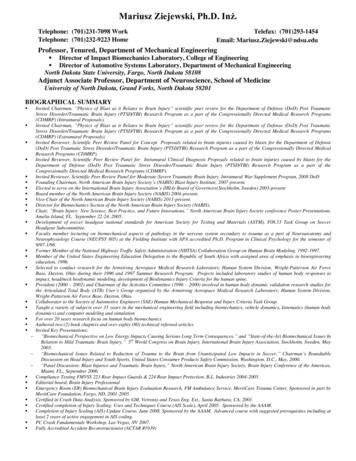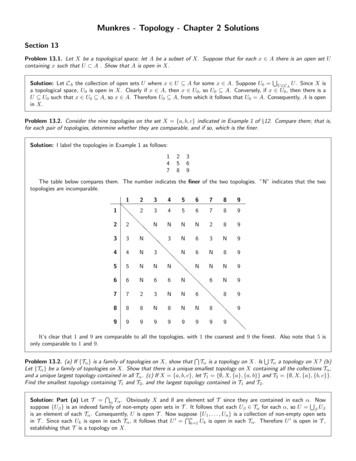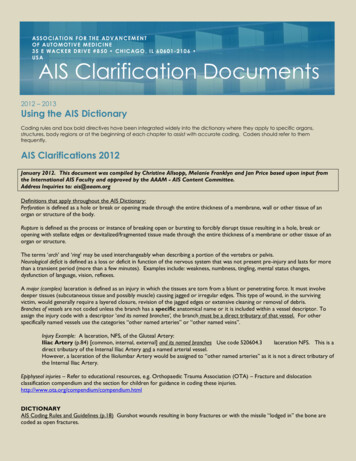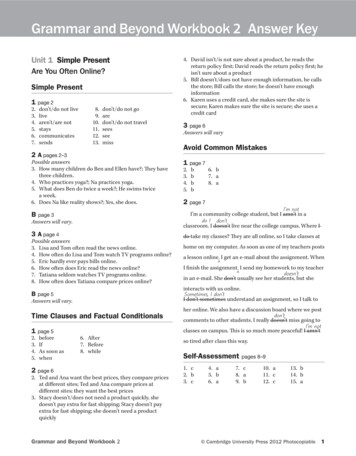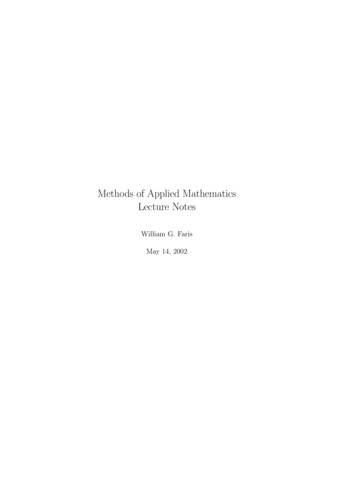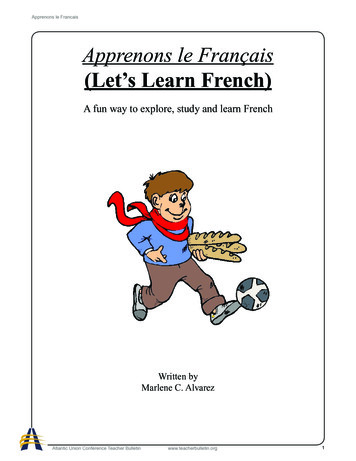
Transcription
Apprenons le FrancaisApprenons le Français(Let’s Learn French)A fun way to explore, study and learn FrenchWritten byMarlene C. AlvarezAtlantic Union Conference Teacher Bulletinwww.teacherbulletin.org1
Apprenons le FrancaisTable of ContentsTable des MatièreIntroductionv Purposev Goalsv Pronunciation GuideMini Unitsv Les Salutations/Greetingsv Les Numéros/Numbersv Les Couleurs/Colorsv Les Jours de la Semaine/The Days of the Weekv Les Mois de l’annéev Les Saisons/SeasonsAtlantic Union Conference Teacher Bulletinwww.teacherbulletin.org2
Apprenons le FrancaisPurposeDiversity is the ingredient that makes the world the rich environment that it is. Inthis diverse society there is the meshing of cultures, customs and languages which creates a rich portrait that can only be created by God. Language is a tool that is used toshare ideas and communicate. Learning a different language is the process of equippingoneself with the key needed to unlock the door of communication with those who speakother languages.The technology available in the 21st century makes it easy to live a comfortable lifewithout learning a new language. Children find that it is a challenge because in their eyesthere seems to be no relevance to their daily lives. The Bible says, “Train up a child in theway that he should go and when he is old, he will not depart from it.” Teaching children adifferent language is teaching them to accept their differences. Whether we are red, yellow,black, or white we are all God’s children. Exposing children to a different language earlyin their lives will broaden their horizons and allow them to communicate with their brothersand sisters and share God’s world together. If we teach the children early to accept eachother and realize that although they may live in different places they still have the sameneeds and learn the same things.The role of educators is to equip students with all of the necessary tools needed tosurvive in this world. Learning to speak another language is difficult but not the lessonsin this unit. This unit provides an easy introduction to the French language. The purposeof this unit is to enable teachers who are not familiar with the French language to learnand to teach their students in a fun and engaging way. The activities provided are easyto accomplish. They make learning a new and different language interesting and fun.Have fun as you discover how to speak one of the most beautiful languages in the world.If there are challenges on the way, remember God tells us in his word “I can do all thingsthrough Christ who strengthens me.”Atlantic Union Conference Teacher Bulletinwww.teacherbulletin.org3
Apprenons le FrancaisContent GoalsThis unit will enable the students to be able to develop the necessary skills needed tolearn a new language.1. To learn the basic elements of reading by learning phonics and pronunciation.Learning the letters of the alphabet is the key to beginning the process.2. Mathematics is essential to daily living. To be able to learn mathematical processesby identifying colors, shapes and learning numbers.3. To learn the basic skills required to greet others and converse in daily livingby identifying classroom objects, weather, and months of the year.Attitudinal GoalsAt the conclusion of this unit the students will be able to:1. Learn to appreciate a new language and a new culture.2. Feel equipped with the necessary tools needed to develop a lifelong love forlearningdifferent languages.3. Have the foundation needed to communicate effectively with French speakers.4. Respect the language and culture of those who speak another language.5. Appreciate diversity.Process Goals1. Students will listen to the sounds.2. Students will practice pronouncing sounds, letters and French vocabularywords.3. Students will be able to form simple sentences with the new acquired vocabulary.Atlantic Union Conference Teacher Bulletinwww.teacherbulletin.org4
Apprenons le FrancaisPronunciation GuideJThe French “J” has a soft sound, like the sound in the middle ofthe English language word “leisure.” There are many French wordsthat have a “nasal” sound which we do not have in English.RThe French “R” should be rolled at the back of the throat, rather likethe sound you make when you gargle.HThe “H” is silent.UIn French the “U” is pronounced like the “ew” in the English work“dew”.Atlantic Union Conference Teacher Bulletinwww.teacherbulletin.org5
Apprenons le FrancaisVowel SoundsFrench LettersEnglish SoundsExampleseun (until)jeé, final –er, final –ez, etay (day)musée, parler, adorez, ete two consonants, ê, éeh (ever)sept, être, élèveeuThere is no English soundequivalent. Round your lipsand try to say eh at the sametime.eu, oeuI (sir)seul, soeuri vowel, illy (yesétudier, fille familley vowelyeuxo final pronouncedo (lost)hommeô, au, eauo (rose)hôtel, au, eauo(oh) When used as the lastsound radio of a word andbefore –sroseouoo (tooth)ouoi, oîwa (watch)troisuThere is no English soundtuequivalent. Round your lipsand try saying oo or ee at thesame time.u vowelwe (we)aah (mama)deuxhuit, suisouiou vowelAtlantic Union Conference Teacher Bulletinlawww.teacherbulletin.org6
Apprenons le FrancaisConsonant SoundsIn the French language, most of the final consonants are not pronounced except forfinal c, f, and r.French Lettersc (before e, i, y)English SoundssExamplesce, cinéma, Nancyca (before a, o, u)sça, garçonc (before a, o, u)kcarotte, commechshchez, Michelj, g (before e, i, y)similar to zhjuge, nageons, je, Jimg (before a, o)hard ggant, gommeh (silent) at thebeginning of wordh (aspirate) at thebeginning or in themiddle of the wordword begins withthe sound of the vowelfar less aspirated thanin Englishhôtelqu, final qkque, cinqrThere is no English soundequivalent. Imitate thesound when you gargle.rouge, trains between vowelszpoison, deserts at beginning of wordssixs before a consonantsdisquessspoisson, dessertthtthé, théâtrexxexcellent, expertxsonly in six, dix andsoixanteAtlantic Union Conference Teacher Bulletinwww.teacherbulletin.orghaine, cahier7
Apprenons le FrancaisNasal SoundsNasal sounds are produced by emitting breath through the nose and mouth at the sametime. Nasal sounds occur when you have vowel n or m. Be careful, because there isno nasal sound for vowel nm, mm, n/m another vowel.Nasal Combinationsan, en, am, emin, ain, im, aimienon, omun, umFrance, Henri, lampe, memberindustrie, pain, important, faimbienbon, bombelundi, parfumLiaison and ElisionLiaison and elision are two pronunciation techniques that make the French languagesound so beautiful. The final consonant of a word is usually not pronounced. Sometimes, however, we do pronounce this final consonant.les amisnous arrivonssept hommes(z)(z)(t)Liaison means to link one word with the word that follows it. We link the final consonantsound of the first word with the beginning vowel sound of the word that follows it to create a liaison.Elision on the other hand occurs when a vowel sound is dropped (usually e or i) at theend of one word if the next word begins with a vowel sound. The vowel that is droppeddoes not disappear. It is replaced by an apostrophe. The elision will most likely occurwith the final e of je, ne, de, que.Je-arriveIl ne-étudie pasLa classe de-histoireQue-est-ce queAtlantic Union Conference Teacher BulletinJ’arriveIl n’étudie pasLa classe d’histoireQu’es-ce quewww.teacherbulletin.org8
Apprenons le FrancaisPack your bags!Get on the plane!Atlantic Union Conference Teacher Bulletinwww.teacherbulletin.org9
Apprenons le FrancaisDid you know that there are many words and phrases that are used in the English language that are adopted from the French language? Here are a few. I hope that youenjoy your trip. Words adopted from the French language1. amour2. au gratin3. avant-garde4. beret5. bistro6. bonbon7. bourbon8. cadet9. cadre10. café11. camaraderie12. camouflage13. carafe14. cartel15. champagne16. chef17. chiffon18. cliché19. clique20. collage21. commune22. corsage23. Crêpe24. crevasse25. critique26. crochet27. croutons28. décor29. enclave30. entréeAtlantic Union Conference Teacher Bulletinwww.teacherbulletin.org10
Apprenons le Francais31. foyer32. fuselage33. garage34. lecture35. levee36. litre37. mademoiselle38. masseur39. montage40. motif41. naiveté42. parfait43. parole44. partisan45. pastel46. penchant47. portage48. purée49. rapport50. reprise51. revue52. ricochet53. rouge54. roulette55. sabotage56. saboteur57. sauté58. savant59. suite60. timbre61. toupee62. vignetteAtlantic Union Conference Teacher Bulletinwww.teacherbulletin.org11
Apprenons le FrancaisPhrases borrowed from FrenchFrench1. á la carte2. au contraire3. au courant4. au naturel5. au revoir6. bête noir7. bon voyage8. cause célèbre9. c’est la vie10. cherchez la femme11. coup de grâce12. coup d’état13. crème de la crème14. de rigueur15. double entendre16. en masse17. fait accompli18. faux pas19. hors d’œuvre20. joie de vivre21. laissez faire22. nom de plume23. nouveau riche24. par excellence25. pièce de resistance26. raison d’être27. sans souci28. savoir faire29. tour de force30. vis-à-visAtlantic Union Conference Teacher BulletinEnglishmeal dishes separately pricedon the contraryup to datein a natural stategoodbyepet aversionhave a good journeysituation arousing attention; noted incidentthat’s lifea woman caused it: look for the womanfinal, decisive actiona sudden change in government, often caused byforcethe very bestindispensable; required by fashion or customdouble meaningas a groupan accomplished and irrevocable fact or actiona social errorappetizerzest or enthusiasm for the pleasures of lifepolicy of non-interferencepen namenewly or recently richof highest qualitymajor or chief item of a seriesreason for beingwithout worrysophistication; know-howfeat of strength or brillianceface to face; in relation towww.teacherbulletin.org12
Apprenons le FrancaisActivity Sheet 1Grades K – 2Écrivez votre nom. /Write your name.Je m’appelleColor the map of a country where French is spoken.Atlantic Union Conference Teacher Bulletinwww.teacherbulletin.org13
Apprenons le FrancaisÉcrivez votre nom. /Write your name.Je m’appelleActivity Sheet 1Grades 3 – 5 (Suggested grades, however can be used for grades 6 – 8 also.)There are many countries where French is spoken. There are some that you know andsome you may not know. See if you can complete this 4.OPH15.16.O17.N18.EAtlantic Union Conference Teacher Bulletinwww.teacherbulletin.org14
Apprenons le FrancaisÉcrivez votre nom. /Write your name.Je m’appelle KEYActivity Sheet 1Grades 3 – 5 (Suggested grades, however can be used for grades 6 – 8 also.)There are many countries where French is spoken. There are some that you know andsome you may not know. See if you can complete this puzzle.Answer NEW HAMPSHIREHAITILAOSSWITZERLANDLUXEMBOURGAtlantic Union Conference Teacher Bulletinwww.teacherbulletin.org15
Apprenons le FrancaisSalutationsAtlantic Union Conference Teacher Bulletinwww.teacherbulletin.org16
Apprenons le FrancaisBonjour!Hello!Comment allez-vous?How are you?Très bien merci. Et vous ?Very well thank you. And you? In this lesson you will learn: how to say hello and goodbyehow to exchange greetingshow observe basic courtesiesAtlantic Union Conference Teacher Bulletinwww.teacherbulletin.org17
Apprenons le FrancaisEnglishGood morning/Good dayFrenchBonjourPronunciationBohn-zhoorGood evening (after 5:00 p.m.) BonsoirBohn-swahrHello/HiSalutSah-lewHow are you?*Comment allez- vous?Koh-mahn tah lay-voo?How are you?Comment vas tu?Koh-mahn vah too?How are you?Ça va?Sah vah?How are things?Comment ça va ?I am fine thank you.Ça va bien merci.Sah vah byan mairsee.And you?Et toi? / *Et vous?Ay twah? / Ay voo?Very well.Très bien.Treh byan.Quite well.Assez bien.A-say byan.So-soComme ci, comme ça.Kohm see, kohm sah.Not very well.Pas très bien.Pah treh byan.Terrible.Très mal.Treh mahl.Thank youMerciMair-seeYou are welcome.De rien.Duh ryan.What is your name?*Comment vous appelezvous?Koh-mahn voo zahpuh-lay voo?What is your name?Comment t’appelles- tu?Koh-mahn tah-pel too?My name is .Je m’appelle .Zhuh mah-pel .What is he/she called?Koh-mahn sah vah?Comment il/elle s’appelle? Koh-mahn eel/el sahpel?He/She is called .Il/Elle s’appelle .Eel/el sah-pel .What are they called?Comment ils s’appellent?Koh mahn eel sah-pel?They are called .Ils/Elles s’appellent.Enchanté.Eel/el sah-pel .Pleased to meet you.Atlantic Union Conference Teacher Bulletinwww.teacherbulletin.orgAhn-shan-tay.18
Apprenons le FrancaisHow old are you?Quel âge as-tu?Kel ah-zh ah too?I am years old.J’ai ans.Zha ahnUntil later.A plus tard.A plew thar.Until next time.À la prochaine.Ah lah proh-shen.See you soon.À bientôtAh byan toeGood bye.Au revoir.Oh ruh-vwahrGood night.Bonne nuitBun nweeYesOuiWeeNoNonNohnPleaseS’il vous plaît.Seel voo hingRienRyanMr., Mrs. & MissMonsieur, Madame & Ma- Muh-syuh, Mah-dahmdemoiselle& Mahd-mwah-zelWrite your nameÉcrivez votre nom.Ay-kree-vay voh-truhnohnIJeZhuhYoutuYooHeileelSheelleelThey (male)ilseelThey (female)elleselWho is that?C’est qui ?Say keyThat is .C’est .Say .my friend (male)mon amimohn ah-memy friend (female)mon amiemohn ah-meAtlantic Union Conference Teacher Bulletinwww.teacherbulletin.org19
Apprenons le Francais*Note to the teacher:I.In French there are different greetings for different times of the day. Salut!is how you say hello to your friends. Salut, can mean “goodbye as well as“hello”. Bon jour is a more polite way to say hello or have a good day. InFrance, it is polite to add Monsieur, Madame or Mademoiselle when yougreet people you don’t know. You say Monsieur to men, Madame to womenand Mademoiselle to girls. There are two ways to say see you later: “Aurevoir!” or “À bientôt”. When you say, “Ça va?” you are not only greetingpeople but you are asking them how they are.II.There are two words for «they» in French: ils and elles. When you arespeaking about boys or men, you use ils. When you are talking about girlsor women, you use elles. If you are speaking about both boys and girlstogether, then you use the word ils.III.«Vous» is used when speaking to an adult or when talking to someone youdo not know.IV.When you see a linking mark between two words, it is important that yousound the last letter of the first word as though it were attached to the nextword: Example (Vous parlez anglais?)V.Pardon can be used to apologize or asked to be excused. It can also beused when you want something repeated (pardon?).Atlantic Union Conference Teacher Bulletinwww.teacherbulletin.org20
Apprenons le FrancaisActivities to do with greetingsü Ask the children to repeat after you when you say thedifferent French greetings.ü Use the sample conversation page to have a conversation with your students, then encourage them tohave conversations with one another. Ask them to gohome and greet their parents in French.ü The children can take turns using the dolls/puppets tohave a conversation.ü The students should cut out the vocabulary cards andmatch the French number with the English number.ü The children can draw a picture where two or moreindividuals are having a conversation.ü Practice writing the greetings by copying them in theirnotebooks.ü Find the greetings in the word search puzzle.Atlantic Union Conference Teacher Bulletinwww.teacherbulletin.org21
Apprenons le FrancaisPremière Leçon /Lesson 1Grades K – 2Goal: To be able to learn the different greetings used in the French language.Materials:1. 2 puppets or dolls (preferably a boy and a girl)2. The map of France.3. The French flag4. The French national anthemProcedure:I. Tell the children that they are going on an adventure to another country.II. Place the map on the board and play the national anthem. Ask them if they knowwhich country they are going to visit.III. Ask them if they know what language is spoken there.IV. Let them meet the puppets/dolls who will be their tour guides on this journey.V. Together name the puppets/dolls. You may give them any name but a Frenchname would be nice.Names: Adèle, Brigitte, Carine, Dominique, Evelyne, Francine, Gertrude,Joanne, Lisbeth, Lisa, Marie, Martine, Nathalie, Nicole, Régine, Sabine,Valérie. (girls)Amos, Francis, Henri, Herve, Lionel, Pierre, or Quesnel. (boys)VI.Let’s say hello !a. Have one of the dolls say hello to the boys and girls and have them repeatafter the doll. Then have them take turns holding the puppet/doll and allowing them to share personal greetings with the puppet/doll.Atlantic Union Conference Teacher Bulletinwww.teacherbulletin.org22
Apprenons le FrancaisLet’s greet one another!This conversation is one that could occur between theteacher and the :Bonjour les enfants.Bonjour Madame/Monsieur .Comment allez-vous?Ça va biens merci, et vous ?Ça va bien eacher:Good morning children.Good morning Mr. /Mrs. .How are you?I am fine thank you, and you?I am fine thank you.(Double click on this when the lesson has ended)Congratulations! Now let’s have a conversation between students.Atlantic Union Conference Teacher Bulletinwww.teacherbulletin.org23
Apprenons le FrancaisThis is a sample conversation between n:Anne:Michelle:Anne:Bonjour Anne, comment ça va?Ça va très bien, et toi ?Ça va bien, merci.Salut Jean.Salut Anne.Comment ça va ?Ça va bien, et toi ?Ça va très bien.Au revoir Anne et Jean.Au revoir Michelle.Jean:A la prochaine JeanAnneMichelleAnneJeanGood morning Anne, how are things?Very well thank you, and you?I am fine, thank you.Hello Jean.Hello Anne.How are things?I am fine, and you?I am very well.Goodbye Anne and Jean.Goodbye Michelle.Until next time Michelle.(Double click on this when the lesson has ended)Congratulations!Atlantic Union Conference Teacher Bulletinwww.teacherbulletin.org24
Apprenons le FrancaisVocabulary ntAllez-vous?Comment vas tu?Ça va?Comment ça va? Ça va bien merci.Atlantic Union Conference Teacher Bulletinwww.teacherbulletin.org25
Apprenons le FrancaisEt toi?Et vous?Très bienAssez bienComme ci commeçaPas très bienTrès malMerciDe rienComment vousappelez vous?Atlantic Union Conference Teacher Bulletinwww.teacherbulletin.org26
Apprenons le FrancaisCommentt’appelles-tu?Je m’appelle.EnchantéA plus tardA la prochaineAu revoirBonne nuitOuiNonS’il vous plaîtAtlantic Union Conference Teacher Bulletinwww.teacherbulletin.org27
Apprenons le elleNote to the teacher: Cut out the cards and allow the students to match the cards.You may wish to play a game where the one who matches their sets first wins.Atlantic Union Conference Teacher Bulletinwww.teacherbulletin.org28
Apprenons le FrancaisVocabulary CardsSalutations/GreetingsGood MorningGood dayGood eveningHelloHi!How are you?How are things?I am fine thankyou.Atlantic Union Conference Teacher Bulletinwww.teacherbulletin.org29
Apprenons le FrancaisAnd you?Very wellQuite wellSo-soNot very wellTerribleThank youYou are welcomeWhat is yourname?My name is .Atlantic Union Conference Teacher Bulletinwww.teacherbulletin.org30
Apprenons le FrancaisPleased to meetyouUntil laterUntil next timeGoodbyeGood nightYesNoPleaseOkaySorryAtlantic Union Conference Teacher Bulletinwww.teacherbulletin.org31
Apprenons le FrancaisNothingMr.Mrs.MissNote to the teacher:There are some definitions in English that can serve for two or more Frenchwords.Atlantic Union Conference Teacher Bulletinwww.teacherbulletin.org32
Apprenons le FrancaisGreetings/Les SalutationsÉcrivez votre nom. /Write your name.Je m’appelleUse this word search puzzle to test the keywordsthat you have just TDZIJPWJCMERCIPDQEFBPENTVLSQPMOZKBIEN, BONJOUR, BONSOIR, ENCHANTE, MADAME,MADEMOISELLE, MERCI, MONSIEUR, NON, RIEN, OUI,PARDON, RIEN, SALUTAtlantic Union Conference Teacher Bulletinwww.teacherbulletin.org33
Apprenons le FrancaisSalut! We are ready tolearn our numbers.Put your hat on and let’sbegin.In this lesson you will learn: how to say the different numbersfrom 1 – 20 in Frenchto count in FrenchAtlantic Union Conference Teacher Bulletinwww.teacherbulletin.org34
Apprenons le erozerozay-rohNote to Teacher - Teach numbers 1 – 10 first and then 11 – 20.Atlantic Union Conference Teacher Bulletinwww.teacherbulletin.org35
Apprenons le FrancaisActivities to do with numbersü Ask the children to write out their phone numbers and practice saying the numbers in French.ü The students should cut out the vocabulary cards and matchthe French number with the English number.ü Fill in the missing dates in the calendar.ü Copy the numbers in French.ü Find the numbers in the word search puzzle.ü Draw the number of objects in the appropriate box.ü Match the objects with the appropriate numbers (1– 0).ü Listen and circle the correct number (0 – 10).ü Listen and circle the correct number (0 – 20).ü Color the correct number.Atlantic Union Conference Teacher Bulletinwww.teacherbulletin.org36
Apprenons le FrancaisVocabulary CardsLes numéros/The ntic Union Conference Teacher Bulletinwww.teacherbulletin.org37
Apprenons le dix-huitdix-neufvingtAtlantic Union Conference Teacher Bulletinwww.teacherbulletin.org38
Apprenons le antic Union Conference Teacher Bulletinwww.teacherbulletin.org39
Apprenons le seventeeneighteennineteentwentyAtlantic Union Conference Teacher Bulletinwww.teacherbulletin.org40
Apprenons le Francais1 2 3 4 5 6 7 8 9 10 Atlantic Union Conference Teacher Bulletinwww.teacherbulletin.org41
Apprenons le Francais11 12 1314 15 16 17 18 19 20 Atlantic Union Conference Teacher Bulletinwww.teacherbulletin.org42
Apprenons le FrancaisÉcrivez votre nom. /Write your name.Je m’appelleFill in the blanks with the missing number.Sun.UnMon. at.septtreizedixneufNumber CalendarsSun.Mon. Tues.28Wed.41016Thurs.Fri.61218Sat.1420Note to the teacherThe older students can complete both calendars; however, the youngerstudents can complete the second calendar as you call out the missingnumbers randomly.Atlantic Union Conference Teacher Bulletinwww.teacherbulletin.org43
Apprenons le FrancaisÉcrivez votre nom. /Write your name.Je m’appelleLes numéros de un – dixNumbers one (1) – ten (10)Copy the numbers in --------------------------Atlantic Union Conference Teacher Bulletinwww.teacherbulletin.org44
Apprenons le FrancaisÉcrivez votre nom. /Write your name. Je m’appelleLes numéros de onze – vingtNumbers eleven (11) – twenty (20)Copy the numbers in Atlantic Union Conference Teacher Bulletinwww.teacherbulletin.org45
Apprenons le FrancaisÉcrivez votre nom. /Write your name.Je m’appelleLes numéros/The numbersUse this word search puzzle to test the numbers that you havejust learned. How many numbers can you XHHTXQUINZEHOZDFWTRBHTENMZBLDWCINQ, DEUX, DIX, HUIT, NEUF, ONZE, QUATORZE, QUATRE,QUINZE, SEIZE, SEPT, SIX, TREIZE, TROIS, VINGT, ZEROAtlantic Union Conference Teacher Bulletinwww.teacherbulletin.org46
Apprenons le FrancaisÉcrivez votre nom. /Write your name.Je m’appelleLes numéros de 1 – 20 (Numbers 1 – 20)Write the correct number in the blank, and then draw the correct number of thingsin the box. Use the first one as your example. sept means 7 cinq meansun meanstrois means dix-neuf means deux meanshuit means onze means six meansvingt means seize means douze meansAtlantic Union Conference Teacher Bulletinwww.teacherbulletin.org47
Apprenons le FrancaisÉcrivez votre nom. /Write your name.Je m’appelleLes numéros de 1 – 10 (Numbers 1- 10)Draw a line from the numbers to the objects in French.dix huit six quatre deux un trois cinq sept neuf Atlantic Union Conference Teacher Bulletinwww.teacherbulletin.org48
Apprenons le FrancaisÉcrivez votre nom/write your nameJe m’appellelisten for the numbers 0 10Listen to the words that the teacher says.Circle the number that tells the meaning of the 796cinq2105six469deux258quatre164Atlantic Union Conference Teacher Bulletinwww.teacherbulletin.org49
Apprenons le FrancaisÉcrivez votre nom/write your name.Je m’appellelisten for the numbers 11 20Listen to the words that the teacher says.Circle the number that tells the meaning of the 1517Treize131215Quinze121513Atlantic Union Conference Teacher Bulletinwww.teacherbulletin.org50
Apprenons le FrancaisÉcrivez votre nom/write your name.Je m’appelleColor the number of white clouds that show the number written atthe bottom of the box then write the number on the line.septcinquntroisneufdeuxhuitquatreAtlantic Union Conference Teacher Bulletinwww.teacherbulletin.orgsix51
Apprenons le FrancaisLet’s talk together.It’s time to practice.This conversation is one that could occur between theteacher and the students. When you speak about their age,ask them to say and point to the number, that shows howold they her:Students:Teacher:Student:Bonjour les enfants.Bonjour Madame/Monsieur .Comment allez vous?Ça va biens merci, et vous?Ça va bien merci.Quel âge as Adele?Adele as ans.Quel âge as-tu?J’ai cher:Teacher:Teacher:Student:Good morning children.Good morning Mr. /Mrs. .How are you?I am fine thank you, and you?I am fine thank you.How old is Adele?How old are you?I am years old.(Double click on this when the lesson has ended)Congratulations! Now let’s have a conversation between studentsAtlantic Union Conference Teacher Bulletinwww.teacherbulletin.org52
Apprenons le FrancaisThis is a sample conversation between Anne:Jean:Bonjour Anne, comment ça va?Ça va très bien, et toi ?Ça va bien, merci.Michelle, quel âge as-tu ?J’ai ans, et toi.J’ai ans.Salut Jean.Salut Anne.Comment ça va ?Ça va bien, et toi ?Ça va très bien.Anne, quel Âge as-tu ?J’ai ans, et toi ?J’ai ans.Au revoir Anne. Au revoir Jean.Bonne nuit Michelle.A la prochaine e:Good morning Anne, how are things?Very well thank you, and you?I am fine, thank you.Michelle, how old are you?I am years oldHello Jean.Hello Anne.How are things?I am fine, and you?I am very well.Anne, quel age a tu ?I am years old.Goodbye Anne. Goodbye Jean.Good night Michelle.Atlantic Union Conference Teacher Bulletinwww.teacherbulletin.org53
Apprenons le FrancaisBonjour! Ça va? We aretaking a wonderful trip. Ournext stop is to learn ourcolors. What color is yourshirt? Is it red, blue, whiteor black? Here we go Put your hat on and let’sbegin.In this lesson you will learn: how to identify the basic colors inFrench.Atlantic Union Conference Teacher Bulletinwww.teacherbulletin.org54
Apprenons le FrancaisEnglishFrenchPronunciation red rougeroozh blue bleu (e)bluh yellow jaunezhohn green vert (e)vair orange orangeoh-rahn-zh pink roserohz black noir (e)nwahr white blanc (he)blahn gray gris (e)gree brown marronmah-rohnHint to the teacher:When there is an (e) or (he) as in the word blanc (he) it is important to notethat the word is spelled without the he when it is used as a masculine wordand wi
learn a new language. 1. To learn the basic elements of reading by learning phonics and pronunciation. Learning the letters of the alphabet is the key to beginning the process. 2. Mathematics is essential to daily living. To be able to learn mathematical pro-cess


